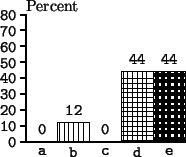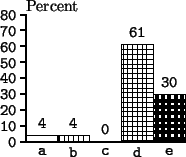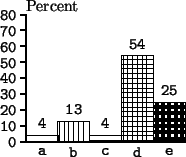|
|
|
|||||||||||||||
|
|
||||||||||||||||
|
Homepage > Assessment > Logic > Question 3 |
||||||||||||||||
|
|
||||||||||||||||
|
|
Philosophy
103: Introduction to Logic
Answer Choices: Since John uses negatively slanted language and Mary's is positively slanted, they disagree in attitude toward the Senator. Since John and Mary disagree on whether the Senator spoke or not, i.e., on what occurred, they disagree in belief as to what transpired. Answer d is then correct--John and Mary agree in attitude, but disagree in belief. Evaluation: These data do not seem comparable between classes. There is surprising consistency both English classes, namely the occurrence of answer d is almost exactly twice as likely as answer e. One would expect that result in an upper level English class, but not a freshman English class. It is not clear why so many logic students select the throw-away answer e. This type of question will require additional hypotheses. |
||||||||||||||
|
Send corrections or suggestions to webmaster@philosophy.lander.edu |
||||||||||||||||
|
Arguments | Language | Fallacies | Propositions | Syllogisms | Translation | Symbolic |
||||||||||||||||
|
|
. |
|
||||||||||||||



